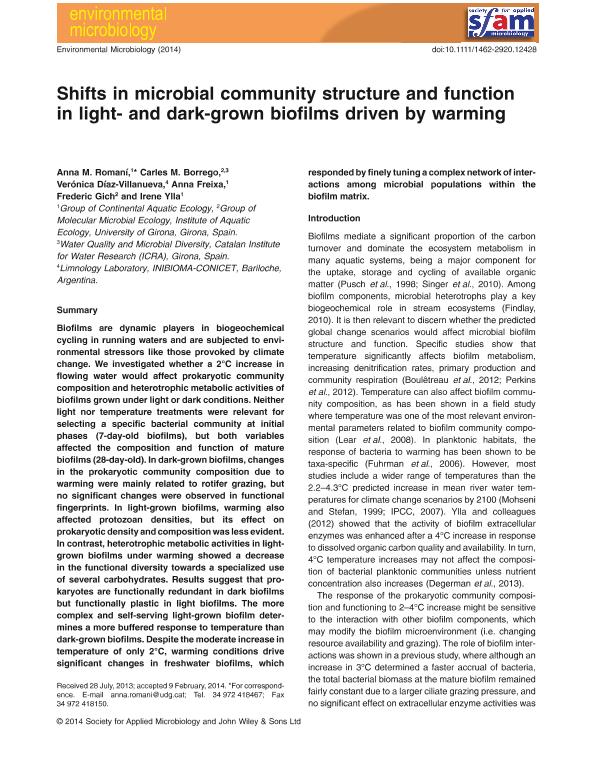Mostrar el registro sencillo del ítem
dc.contributor.author
Romaní, Anna
dc.contributor.author
Borrego, Carles M.
dc.contributor.author
Diaz Villanueva, Veronica

dc.contributor.author
Feixa, Anna
dc.contributor.author
Gaush, Frederic
dc.contributor.author
Ylla, Irene
dc.date.available
2017-01-20T21:26:08Z
dc.date.issued
2014-03
dc.identifier.citation
Romaní, Anna; Borrego, Carles M.; Diaz Villanueva, Veronica; Feixa, Anna; Gaush, Frederic; et al.; Shifts in microbial community structure and function in light- and dark-grown biofilms driven by warming; Wiley; Environmental Microbiology; 16; 8; 3-2014; 2550-2567
dc.identifier.issn
1462-2912
dc.identifier.uri
http://hdl.handle.net/11336/11723
dc.description.abstract
Biofilms are dynamic players in biogeochemical cycling in running waters and are subjected to environmental stressors like those provoked by climate change. We investigated whether a 2°C increase in flowing water would affect prokaryotic community composition and heterotrophic metabolic activities of biofilms grown under light or dark conditions. Neither light nor temperature treatments were relevant for selecting a specific bacterial community at initial phases (7-day-old biofilms), but both variables affected the composition and function of mature biofilms (28-day-old). In dark-grown biofilms, changes in the prokaryotic community composition due to warming were mainly related to rotifer grazing, but no significant changes were observed in functional fingerprints. In light-grown biofilms, warming also affected protozoan densities, but its effect on prokaryotic density and composition was less evident. In contrast, heterotrophic metabolic activities in light-grown biofilms under warming showed a decrease in the functional diversity towards a specialized use of several carbohydrates. Results suggest that prokaryotes are functionally redundant in dark biofilms but functionally plastic in light biofilms. The more complex and self-serving light-grown biofilm determines a more buffered response to temperature than dark-grown biofilms. Despite the moderate increase in temperature of only 2°C, warming conditions drive significant changes in freshwater biofilms, which responded by finely tuning a complex network of interactions among microbial populations within the biofilm matrix
dc.format
application/pdf
dc.language.iso
eng
dc.publisher
Wiley

dc.rights
info:eu-repo/semantics/openAccess
dc.rights.uri
https://creativecommons.org/licenses/by-nc-sa/2.5/ar/
dc.subject
Biofilm
dc.subject
Temperature
dc.subject
Bacteria
dc.subject
Functional Diversity
dc.subject.classification
Ecología

dc.subject.classification
Ciencias Biológicas

dc.subject.classification
CIENCIAS NATURALES Y EXACTAS

dc.title
Shifts in microbial community structure and function in light- and dark-grown biofilms driven by warming
dc.type
info:eu-repo/semantics/article
dc.type
info:ar-repo/semantics/artículo
dc.type
info:eu-repo/semantics/publishedVersion
dc.date.updated
2016-12-12T14:20:23Z
dc.journal.volume
16
dc.journal.number
8
dc.journal.pagination
2550-2567
dc.journal.pais
Reino Unido

dc.journal.ciudad
Londres
dc.description.fil
Fil: Romaní, Anna. Universidad de Girona; España
dc.description.fil
Fil: Borrego, Carles M.. Universidad de Girona; España. Institut Català de Recerca de l; España
dc.description.fil
Fil: Diaz Villanueva, Veronica. Consejo Nacional de Investigaciones Científicas y Técnicas. Centro Científico Tecnológico Patagonia Norte. Instituto de Investigación en Biodiversidad y Medioambiente; Argentina
dc.description.fil
Fil: Feixa, Anna. Universidad de Girona; España
dc.description.fil
Fil: Gaush, Frederic. Universidad de Girona; España
dc.description.fil
Fil: Ylla, Irene. Universidad de Girona; España
dc.journal.title
Environmental Microbiology

dc.relation.alternativeid
info:eu-repo/semantics/altIdentifier/url/http://onlinelibrary.wiley.com/doi/10.1111/1462-2920.12428/abstract
dc.relation.alternativeid
info:eu-repo/semantics/altIdentifier/doi/http://dx.doi.org/10.1111/1462-2920.12428
Archivos asociados
